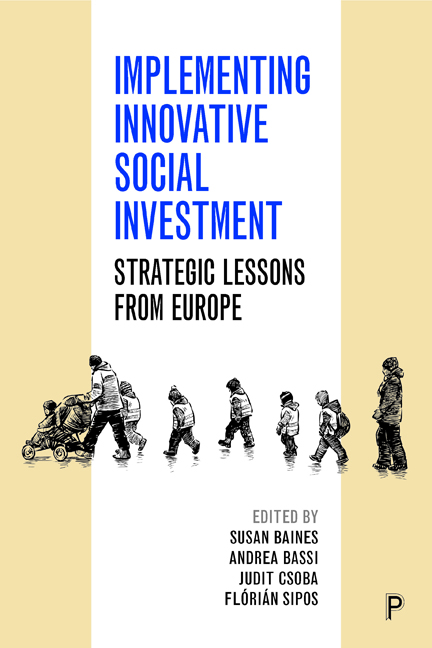Book contents
- Frontmatter
- Contents
- List of tables, figures, images and boxes
- Notes on contributors
- Acknowledgement
- one Social Investment in welfare: a sub-national perspective
- Part A Children and families: early intervention in people’s life courses
- Part B From a caring state to an investing state: labour market activation
- Part C Social solidarity and Social Investment
- Index
six - Acquiring work experience for vocational education graduates in Greece
Published online by Cambridge University Press: 21 April 2022
- Frontmatter
- Contents
- List of tables, figures, images and boxes
- Notes on contributors
- Acknowledgement
- one Social Investment in welfare: a sub-national perspective
- Part A Children and families: early intervention in people’s life courses
- Part B From a caring state to an investing state: labour market activation
- Part C Social solidarity and Social Investment
- Index
Summary
Introduction
The social, economic and working environment in Greece is defined by volatility and insecurity. The programme ‘An Integrated Intervention for Connecting Vocational Schools Graduates with the Labour Market’ was a cooperative action for addressing the issue of youth unemployment. The initiative was deployed in the eight Convergence Regions of Greece: Eastern Macedonia and Thrace; Epirus; Western Greece; Thessaly; Peloponnesus; Crete; Ionian Islands; and Northern Aegean. They were hit by a large increase of unemployment rates between 2010 and 2014, for example, from 11.9% to 28.7% in Western Greece, from 9.6% to 23.4% in Peloponnesus, from 9.4% to 22.3% in North Aegean, and from 12.0% to 24.0% in Crete (ELSTAT, 2015). The beneficiary group of the intervention was 7,000 graduates of vocational training institutes (IEK), apprenticeship schools (EPAS) and vocational upper-secondary schools (EPAL), aged up to 29 years old and unemployed when the programme took place. A large number of participating enterprises were included as part of an integrated project that aimed at providing: (1) theoretical education; (2) vocational counselling; and (3) the acquisition of work experience (internships) as a means of tackling the adverse impact of unemployment.
The programme had both investive and innovative dimensions. More than being a means of transferring knowledge and expertise to a large number of participants, it particularly tried to empower them to become active agents of change in their own lives. Further to that, and related to previous similar projects, individualised vocational counselling sessions and quality-controlled internships combined with theoretical education were types of services introduced to beneficiaries for the first time (Evers et al, 2014). In that respect, the programme aimed to forge prospects for vocational training graduates, functioning as a tipping point in their life course and their connection with the labour market.
Connecting unemployed vocational education graduates with the labour market
During 2010–14, the age group of young people up to 29 years old was at the centre of the adverse impact on the labour market of the economic crisis in Greece that commenced in 2009. This was in particular evident in exceedingly high rates of unemployment in 2014: at 51.5% of 15–24 year olds and 41.1% of 25–29 year olds (ELSTAT, 2014).
- Type
- Chapter
- Information
- Implementing Innovative Social InvestmentStrategic Lessons from Europe, pp. 97 - 112Publisher: Bristol University PressPrint publication year: 2019

